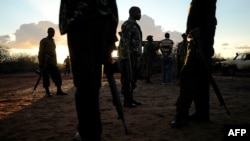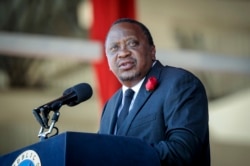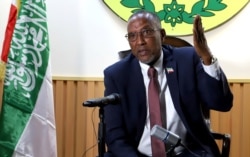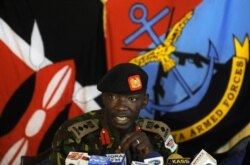In the wake of Somalia's announcement this week that it is severing diplomatic ties with Kenya, the Nairobi government says it will not expel Somali diplomats and instead will seek talks with its neighbor.
Meanwhile, Kenya's President Uhuru Kenyatta on Tuesday finished hosting a three-day visit aimed at bolstering ties with Somaliland President Muse Bihi Abdi.
Kenyatta had invited the leader of Somalia's breakaway state, who arrived Sunday.
Somalia's decision was announced late Monday by Information Minister Osman Dubbe, who told VOA it came in response to what he called Kenya's constant, blatant interference with Somali sovereignty.
In his nationally televised address, Dubbe said the government ordered all Somali diplomats in Kenya to return home and gave Kenyan diplomats in Somalia seven days to leave the country.
Kenyan government spokesman Cyrus Oguna on Tuesday told reporters that Nairobi would not expel Somalia diplomats or citizens in response to Mogadishu's decision to sever ties.
"We all know that Kenya and Somalia have a lot in common and many issues that bring us together. We have a history that unites us. We have economic and even social cohesion," Oguna told reporters at a news conference.
"You also know that we have our (Kenyan Defense Forces) guarding the security of Somalia. … There is also the issue of diplomacy and international relations that require sincere cooperation. Do good to me, and I will do good to you."
A few hours after Somalia announced its diplomatic break with Kenya, the Somalia National Army (SNA) was deployed to the common border, according to Kenyan media. In Mandera County, residents reported seeing SNA troops taking strategic positions along the border.
Bihi said Somaliland would not enforce Mogadishu's order for Kenyans to leave.
An estimated 219,000 Somali civil war refugees have been living in Kenya's Dadaab refugee complex, one of the world's largest refugee camps, since 1991, according to the U.N. Refugee Agency. It said another 130,000 Somalia refugees poured into Kenya's Hagadera refugee camp in 2011 to flee drought and famine.
'Nothing to do with us'
In an interview Tuesday with VOA's Somali Service, Bihi insisted that his visit with Kenyatta played no role in the Kenya-Somalia split.
"The relationship between Somalia and Kenya is up to them, and it has nothing to do with us," he said. "But if Somalia cuts off the diplomatic relationship of any country that establishes a relationship with Somaliland, which has been away from Somalia for the last 30 years, we will see to whom Somalia will have a relationship."
Somaliland seceded from Somalia in 1991 and declared its independence, though that has not been recognized by the United Nations, the African Union or any other country. The Somali government insists that Somaliland is part of the country. In 2019, Mogadishu cut off relations with Guinea after the West African country established a new relationship with Somaliland.
Bihi blamed Somalia's central government for delaying planned talks with Somaliland. Representatives of both governments met in Djibouti on June 14, agreeing to appoint a technical committee to continue the talks and to avoid politicizing any international development assistance and investment. But the committee has never met.
Building Kenyan-Somaliland cooperation
On Tuesday, Kenyatta and Bihi issued a joint statement reaffirming "their unwavering commitment to deepen the cordial bilateral relations" of their respective lands.
The document outlined measures to strengthen Kenya's and Somaliland's diplomatic and economic ties. It said that by the end of March, Kenya would open a consulate in the Somaliland capital of Hargeisa and also would authorize Kenyan airlines to begin direct flights there from Nairobi.
The statement identified other areas of cooperation, including expanding trade and continued efforts to combat terrorism in the region, most notably by al-Shabab militants.
Oguna said he hoped for intervention in the diplomatic crisis. He cited the Djibouti-based Intergovernmental Authority on Development, an eight-country trade bloc in the Horn of Africa, and the Zambia-based Common Market for Eastern and Southern Africa, a free-trade area of 21 member states reaching from Tunisia to Eswatini.
Sahra Nur of VOA's Somali Service contributed to this report, as did Kennes Bwire and Hubbah Abdi of VOA's Swahili Service. Abdi reported from Nairobi, Kenya.







